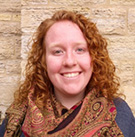Clara Kent

Graduation Year: 2014
Major: Anthropology with Wheaton's Human Needs and Global Resources ( ) certificate, and a minor is Sociology
As an Anthropology major with a Sociology minor, Clara served as the SESA (Students Engaging in Sociology & Anthropology) coordinator. In this vital role, Clara engaged these disciplines to inform and educate her worldview. She has been learning about different cultures and understanding societal issues to determine where she can influence change. Clara is not content to only learn what can be done, but is pursuing how she can engage in issues to make a difference in this world. Under the tutelage of , she was awarded the Humanity in Action (HIA) fellowship in Spring 2013.
Why did you choose Anthropology?
My first Anthropology class was meant to be just a gen ed, but as the course progressed I realized that Anthropology could help give me the language that I needed to better understand my life, the world around me, and God's work in the world. I particularly remember feeling energized by the way that Anthropology helped me to analyze and deconstruct my own assumptions and experiences, as opposed to just studying other people. I will also add that, along with my Anthropology classes, my other most meaningful classes at Wheaton were my Sociology classes. Those courses worked alongside my Anthropology to teach me about society's systems and structures. I really can't imagine my time at Wheaton without both Anthropology and Sociology.
How did that affect your career choice?
My Intro to Anthro class is the one that hooked me, but I was probably really "converted" in my Culture in the Contemporary World class with . Examining race and gender, privilege and power, so openly really was a turning point in my thinking and feeling. I probably knew then that, whatever I did after Wheaton, I'd want to work with others to address some of the inequalities around me. My Social Class and Inequality class with first started to help me see the very real ways that inequalities are reified and perpetuated. And then my Culture and the Material World class with Dr. Tooley really drilled in the reality that the very physical inequalities in the world have to be addressed. I'm still figuring out my career choice though. So it'll take some time to flesh all of this out.
Which professors impacted you?
This is a very long answer. Dr. Howell was my first Anthropology professor and also the first professor at Wheaton to really mentor me and give me both academic and personal guidance at Wheaton. In fact, there were several times that Dr. Howell encouraged and pushed me to pursue opportunities that I would not have thought myself qualified for otherwise. Those opportunities turned out to be really important experiences when I was at Wheaton. Dr. Folch also came alongside me in a big way my last two years at Wheaton. As I was processing experiences at Wheaton, on HNGR, post-HNGR, job applications, and even now in post-grad life, she's been around to help me think and grow. And I have to give some credit to Dr. Kim. He's the only professor who ever made me feel encouraged by yelling at me. He challenged me to push myself in big ways and has always managed to do so while affirming that I can, in fact, do my work better. It's been strangely encouraging. He also always encouraged me to pray, even when I didn't feel like it. Dr. Tooley has also been both a professor and advisor and mentor. With all the craziness that junior and senior year are, Dr. Tooley has listened and given sound advice and encouragement. Also, Dr. Hawkins. She's not Soc/Anth, but I don't think I would have made it through Wheaton without her.
How and why did you choose to follow your path beyond graduation?
Well, I joined in the frenzy of job applications second semester of senior year. I probably applied for 40 jobs. But some things I knew. I knew that I'd be happiest working with people, and ideally people from diverse backgrounds and in contexts other than those I was familiar with. I can definitely fit the non-profit type, so I pursued opportunities in that field. My current position was honestly a mix of where I looked and applied, the experiences I had already had, and being lucky enough to actually be offered a job.
What are you doing now?
I'm currently working with Chicago Lawyers' Committee for Civil Rights in Chicago and am in the process of applying to law school. There are lots of avenues I could pursue to work towards justice and reconciliation, but I'm choosing to pursue law because it can give a balanced approach to addressing both individual circumstances and larger, societal structures. It's also an area that I think can benefit from people practicing with cultural/societal "lens" on.
What advice could you give a potential major?
Get to know your professors. That's one of the golden parts of Wheaton - you actually can know your professors. And they're really very nice. Try lots of new experiences. Say "no" to very few things. Take both Anthro and Soc classes. You need both. Try your hardest to work well. Just do your thing. Go to the Happy Hours. Ask questions when the department brings in speakers.